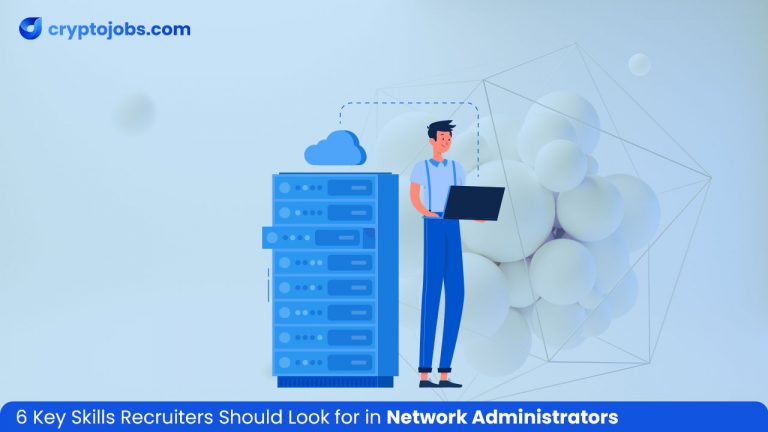
6 Key Skills Recruiters Should Look for in Network Administrators
- cryptojobs.com
- March 26, 2024
- All Posts, Employer’s Guide
- hiring
- 0 Comments
In the ever-changing field of blockchain network administration, recruiters should look for candidates who possess both technical expertise as well as interpersonal skills. As the backbone of an enterprise’s IT system, network administrators are in charge of maintaining data integrity and facilitating smooth communication. Finding those with the necessary talents is, therefore, crucial to the success of the organization.
In this article, we explore the essential skills that hiring managers should look for in a blockchain network administration specialist. We have identified six key skills that are essential for succeeding in this profession based on industry data and expert perspectives.
1. Problem-Solving
Solving problems is a crucial ability for blockchain network managers. They deal with a variety of issues on a regular basis, such as hardware failures, software bugs, and network outages. These specialists use their skills in problem-solving to carefully analyze problems and provide customized solutions. Frequently combining this ability with their technical knowledge, they solve issues for colleagues and clients with ease.
Additionally, network administrators use their aptitude for problem-solving to innovate and optimize company networks and IT systems, skillfully coordinating duties like normal maintenance and system updates.
2. Troubleshooting
Troubleshooting, or the art of identifying and resolving problems with computer hardware and software, is a vital skill for network administrators. By utilizing troubleshooting techniques, these experts carefully detect and resolve network disruptions, malfunctions, and other potential issues. Troubleshooting is a wide range of activities that fall within the jurisdiction of a network administrator, from maximizing network performance to fixing user application problems and addressing connection difficulties.
Moreover, network administrators are skilled in identifying and fixing problems with both hardware and software, frequently using remote troubleshooting methods to guarantee prompt resolution. Troubleshooting is essentially a fundamental skill that network administrators use on a regular basis to ensure that computer systems and networks operate without a hitch.
3. Organizational Skills
Network administrators need to be very organized in order to properly handle paperwork pertaining to the systems and networks they are responsible for. These experts methodically document settings, hardware and software incompatibilities, cabling layouts, and common mistakes.
They also create user instructions specifically for novice users and keep extensive logbooks that record network changes. A good eye for detail guarantees the production of comprehensive documentation, which is a great help to newcomers and upcoming members of the IT team who are trying to understand the complexities of the company’s networks and systems and promotes smooth operations.
4. Network Infrastructure
Recruiters should look for network administrators who have experience managing network infrastructure. This means managing the software and hardware needed to link computers and other devices in a network. This ability allows network administrators to apply updates, monitor equipment performance, and quickly fix problems as they appear. They play a critical role in guaranteeing the smooth operation of the organization’s internal systems.
An excellent network administrator shows how to maximize network infrastructure through the recommendation of efficient network addressing schemes, the creation of layouts for various network configurations, and the selection of suitable connecting devices to improve overall dependability and efficiency.
5. Critical Thinking
Among the fundamental skills that recruiters look for in network administrators is critical thinking. In the field of networking, these experts are responsible for thoroughly analyzing linked systems and the resulting effects. Network administrators skillfully examine workplace situations by applying their critical-thinking abilities and making use of their resources and expertise to create workable solutions.
For example, they systematically prepare and carry out the necessary actions when faced with security breaches. With the use of this talent, they will be able to carry out in-depth studies, formulate relevant questions, and carefully consider various solutions, determining their viability and effectiveness to guarantee the best results.
6. Technical Support
When hiring network administrators, recruiters should give priority to candidates who are proficient in technical assistance. These experts are essential in helping team members who are having problems with hardware and software. Network administrators provide direction to local technical support employees by utilizing their technical support knowledge, guaranteeing smooth communication and updates to upper management.
Furthermore, blockchain network administrators are proficient in setting up, adjusting, and debugging both dispersed and centralized network components. Their skill set includes communicating with program providers for maintenance and updates, as well as doing other ad hoc technical support duties.
Conclusion
Recruiters may strengthen their organizations with competent network administrators capable of navigating the complexities of contemporary network infrastructures by seeking people who possess these six essential qualities. Setting these skills as a top priority in the talent acquisition process guarantees the development of a strong and resilient IT ecosystem.
Are you looking for qualified network administrators for blockchain systems? You need to go no further than Cryptojobs.com, the best place to find outstanding candidates for blockchain network administrator jobs. Investigate our platform now to discover the ideal solution for your organization and take your company to new heights in the digital sphere.




